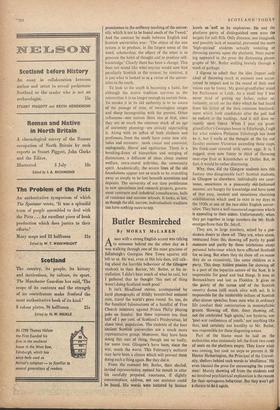Butler Besmirched
By MORAY McLAREN A MAN with a strong English accent was talking to someone behind me the other day as I was walking through one of the most gracious of Edinburgh's Georgian New Town squares still left to us. He was, even at this late date, still talk- ing about the horrible behaviour of the Glasgow students to their Rector, Mr. Butler, at his in- stallation. I didn't hear much of what he said, but I gathered that he thought 'this sort of thing wasn't doing Scotland much good.'
It isn't. Headlined stories, accompanied by lurid photographs of filthily besmirched eminent men, travel the world's press round. So, too, do the fanatical fulminations of a handful of Free Church ministers against Prince Philip playing polo on Sunday. But these represent less than half of 1 per cent. of Scotland's Presbyterian, let alone total, population. The students of the four ancient Scottish universities are a much more representative group. Moreover, they have been doing this sort of thing, though not so badly, for some time. Glasgow's have been, since the war, much the worst. This February's outburst may have been a climax which will prevent them doing such a thing again. But they did it.
From the moment Mr. Butler, their elected, invited representative, opened his mouth to utter his carefully prepared, courteous, if slightly commonplace, address, not one sentence could be heard. His words were battered by human howls as well as by explosives. He and the platform party of distinguished men were the targets for soft filth. Only distance, one imagined, and possibly lack of material, prevented the more 'high-spirited' students actually vomiting or throwing excreta upon the platform. Next morn- ing appeared in the press the distressing photo- graphs of Mr. Butler smiling bravely through a mask of garbage.
I digress to admit that the idea (repeat only idea) of throwing muck at eminent men accus- tomed to respect and to the sound of their own voices can be funny. My.great-grandfather stood for Parliament at Leith. As a small boy I was never tired of getting my father, rather re- luctantly, to tell me the story which he had heard from his father of the then common bombard- ment which both candidates after the poll had to endure at the hustings. And it still does re- motely seem funny. When I pass my great- grandfather's Georgian house in Edinburgh, I sigh for what modern Philistine Edinburgh has done to it, but I smile at the thought of the {in our family) eminent Victorian ascending those steps, his frock-coat covered with rotten eggs. It is, 1 suggest, even now funny to think of throwing over-ripe fruit at Khrushchev or Dulles. But, in fact, it would be rather distressing.
Why, then, did the Glasgow students turn this fantasy into disagreeable fact? Scottish students, in Glasgow as' elsewhere, individually are cour- teous, sometimes in a pleasantly old-fashioned manner, are hungry for knowledge and have none of that easy, insolent and sometimes charming exhibitionism which used to exist in my days in the 1920s at one of the two older English univer- sities. They have a well-mannered eagerness which is appealing to their elders. Unfortunately, when they get together in large numbers the Mr. Hyde emerges from their Dr. Jekyll.
They are, in large numbers, seized by a pas- sionate desire to show off. They are, when alone, restrained from this showing off partly by good manners and partly by those inhibitions about personal behaviour which have afflicted Scotland for so long. But when they do show off en masse they do so excessively, like some children at ,a party. This deep, hidden passion for showing off is a part of the bipartite nature of the Scot. It is responsible for good and bad things. It won us Bannockburn and lost us Flodden. It gives us the gaiety of the tartan mid' of the Scottish country dance (still much alive with us). It is responsible for the intolerable tedium of Scottish after-dinner speeches from men who in ordinary life conduct their conversation in monosyllabic grunts. Showing off, then, sheer showing off, not the celebrated 'high spirits,' nor hysteria, nor 'post-war restlessness of youth,' nor anything like that, and certainly not hostility to Mr. Butler, was responsible for these disgusting scenes.
Part of the blame must be laid on the authorities who ominously left the front two rows of seats on the platform empty. They knew what was coming, but took no steps to prevent it. Sir Hector Hetherington, the Principal of the Univer- sity, shelters behind such words as 'ebullience.' He even blamed the press for encouraging the young men! Merely showing off from the students and no involved psychiatrical explanation is the reason for their outrageous behaviour. But they won't get a chance to do it again.












































 Previous page
Previous page